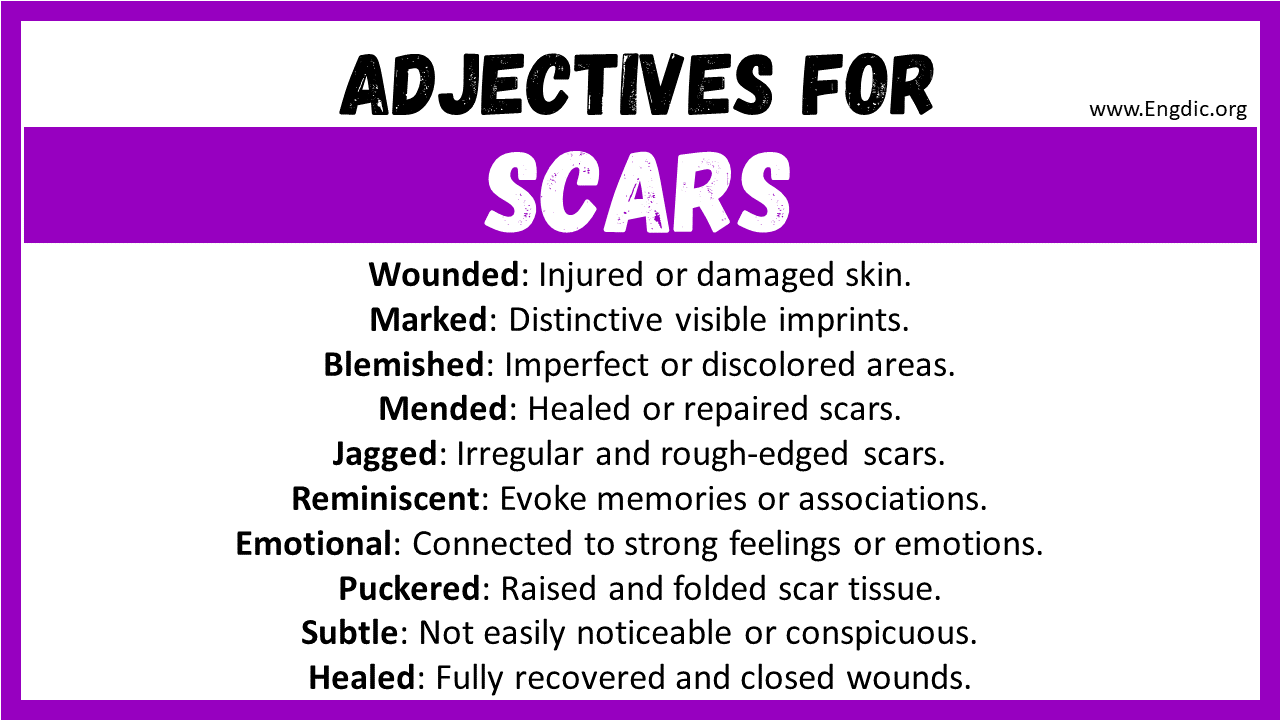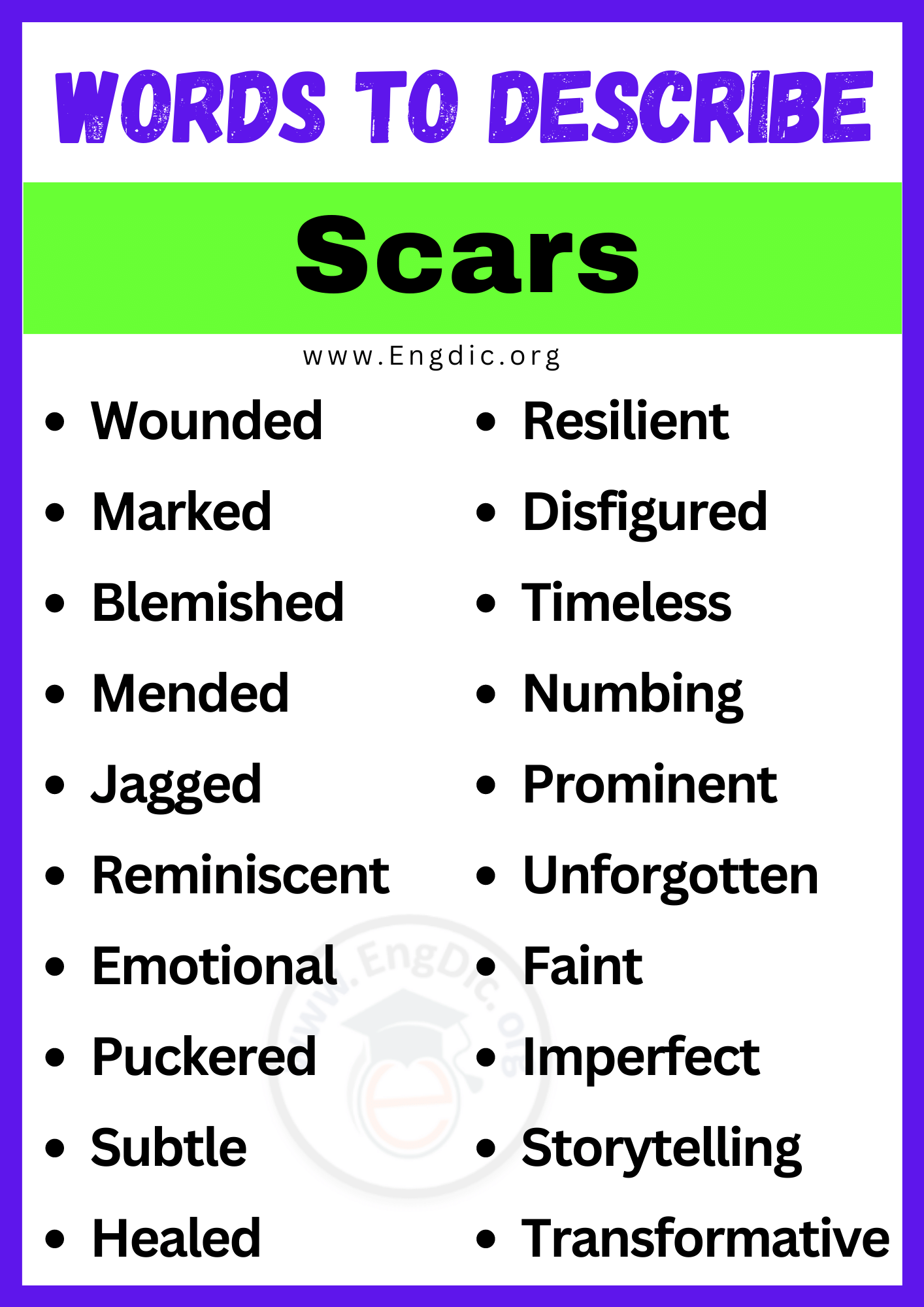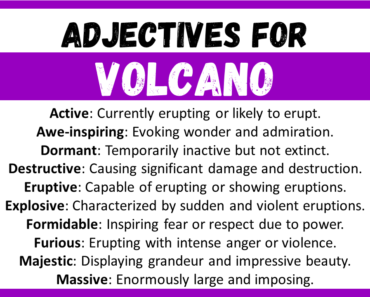Scars, in simple terms, are marks or imperfections that remain on the skin after a wound or injury has healed. These visible reminders can evoke various emotions, and people often use descriptive words to express their appearance and significance. From “faded” and “raised” to “discolored” and “reminiscent,” the words used to describe scars capture their unique characteristics and the stories they carry. In this blog post, we will delve into a collection of words that beautifully illustrate the diverse nature of scars and the emotions they can evoke.
Adjectives for Scars
Here are the 20 Most Popular adjectives for scars:
- Wounded
- Marked
- Blemished
- Mended
- Jagged
- Reminiscent
- Emotional
- Puckered
- Subtle
- Healed
- Resilient
- Disfigured
- Timeless
- Numbing
- Prominent
- Unforgotten
- Faint
- Imperfect
- Storytelling
- Transformative
Adjectives for Scars In Writing:
- Evocative
- Emotional
- Poignant
- Haunting
- Vivid
- Symbolic
- Descriptive
- Raw
- Intriguing
- Powerful
Adjectives for Scars in Medical:
- Healing
- Surgical
- Keloid
- Discolored
- Hypertrophic
- Faint
- Raised
- Fresh
- Old
- Sensitive
Adjectives for Scars Tissue:
- Fibrous
- Regenerated
- Damaged
- Adhesive
- Elastic
- Contracted
- Irregular
- Dense
- Smooth
- Hypertrophic
Words to Describe Scars with Meanings
- Wounded: Injured or damaged skin.
- Marked: Distinctive visible imprints.
- Blemished: Imperfect or discolored areas.
- Mended: Healed or repaired scars.
- Jagged: Irregular and rough-edged scars.
- Reminiscent: Evoke memories or associations.
- Emotional: Connected to strong feelings or emotions.
- Puckered: Raised and folded scar tissue.
- Subtle: Not easily noticeable or conspicuous.
- Healed: Fully recovered and closed wounds.
- Resilient: Capable of bouncing back or recovering.
- Disfigured: Altered appearance due to scarring.
- Timeless: Enduring and long-lasting scars.
- Numbing: Loss of sensation in scarred areas.
- Prominent: Highly visible and noticeable scars.
- Unforgotten: Still remembered or etched in memory.
- Faint: Barely visible or indistinct scars.
- Imperfect: Scars that deviate from normal appearance.
- Storytelling: Carrying stories or experiences.
- Transformative: Causing significant changes or impacts.
Example Sentences for Scars Adjectives
- After the accident, wounded soldiers returned home.
- The artist captured the marked scar beautifully.
- She was self-conscious about her blemished skin.
- With proper care, the wound was mended nicely.
- The jagged scar marred his face.
- The old letter was reminiscent of her past.
- Her emotional reaction surprised everyone.
- The puckered scar formed an interesting pattern.
- The scar was so subtle that it went unnoticed.
- Over time, the wound healed completely.
- Despite the hardships, her spirit remained resilient.
- The accident left him with a disfigured face.
- The timeless scar told a tale of bravery.
- The numbing cream helped ease the numbing pain.
- The prominent scar drew the attention of others.
- The soldier carried his unforgotten scars with pride.
- His childhood injury left a faint mark.
- The artist embraced the beauty of imperfect scars.
- Each scar tells a unique storytelling journey.
- The accident had a transformative impact on her life.
Explore More Words:
FAQ’s
How to describe scars in writing?
Describe scars in writing using evocative adjectives, capturing their emotional and visual aspects.
What is the appearance of scars?
Scars can vary in appearance, from faint lines to raised, puckered, or discolored marks.
Why are scars so beautiful?
Scars can be considered beautiful as they represent resilience and the stories of survival they carry.








